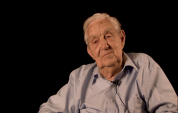4:49 | It was on his 7th mission that B-17 flight engineer Marvin Russell watched his aircraft get riddled with bullets from a German ME-109. As the pilot tried desperate maneuvers to escape, he watched the fire along the wing grow larger and larger until there was no other choice. They had to bail out.
Keywords : Marvin Russell flight engineer Boeing B-17 Flying Fortress Oberpfaffenhofen Germany Lake Constance Swiss border Lockheed P-38 Lightning North American P-51 Mustang Messerschmitt Bf 109 (ME-109) bail out

If you enlist together, you can serve together. Like so many others, Marvin Russell and his buddies joined up, only to be split up almost immediately. He went to aircraft mechanic school and became a flight engineer on a B-17 crew.
It was the day to practice bomb but there were no practice bombs available. The crews were allowed to take a pleasure flight anywhere they wanted. Marvin Russell's crew headed up to Atlanta, but they never got there after a close encounter with a tree.
The southern route across the Atlantic required extra fuel tanks on the aircraft. Flight engineer Marvin Russell had to repair one of them after the first leg of the flight. Eventually, they got to England where they went out to a pub and were greeted by a German rocket.
After bailing out over Germany, Marvin Russell couldn't find any of his crew where he landed. He found a Italian work crew and tried to get some civilian clothes from them, but he wound up in the hands of the Germans. He was taken eventually to a military base where he was subjected to a humiliating interview.
Marvin Russell was taken to the interrogation center in Frankfurt, where he was struck by a German major when he refused to provide anything except his name, rank and serial number. Then, they showed him a dossier with surprising contents.
After his interrogation, downed airman Marvin Russell was sent to Stalag 17B in Austria. Living conditions were minimal, with no heat and little food. No breakfast was the standard but on Christmas morning, he got a bowl of oatmeal with a little extra protein.
Red Cross Parcels were not a regular thing at Stalag 17B and, when the prisoners did get some, the guards liked to puncture them with their bayonets. Marvin Russell was interned there and he has a couple of stories you may not want to hear, one about the cats in the camp and one about the lack of toilet paper.
In the prison camp, cigarettes were currency and the guards loved them. Marvin Russell didn't smoke, so with his packs from the Red Cross parcels he could get more D-bars. Next to his compound was the Russian POW compound, where conditions were nightmarish and grizzly.
The Russian Army was approaching, so the prisoners of Stalag 17B were forced onto the road where they could hear explosions coming from Vienna. They marched for six weeks with little food except what they could forage. At one point, they passed a group on the road that was even more pitiful than they were and who were headed to a much worse fate.
At the end of the forced march was a clearing in the Alps. Guard towers had been constructed but white flags started appearing in the nearby town. Soon, a lone US tank came into the camp. The following day, trucks with food arrived and each prisoner, including downed airman Marvin Russell, got his own loaf of good American bread. Liberation day had come.
Somewhere in the spotty mail he received as a POW, Marvin Russell got the impression that his father had died. After his liberation and voyage home, he called his mother and got a big surprise.
As if a year in a German prison camp wasn't enough misery, when Marvin Russell was settling into life back home after the war, he suffered a serious injury which nearly took his life. Two things saved him, a new drug and an innovative doctor.
No one escaped during Marvin Russell's time in Stalag 17B, although there was one notable attempt. He was never tortured, unless you count the lack of food, heat and clothing.